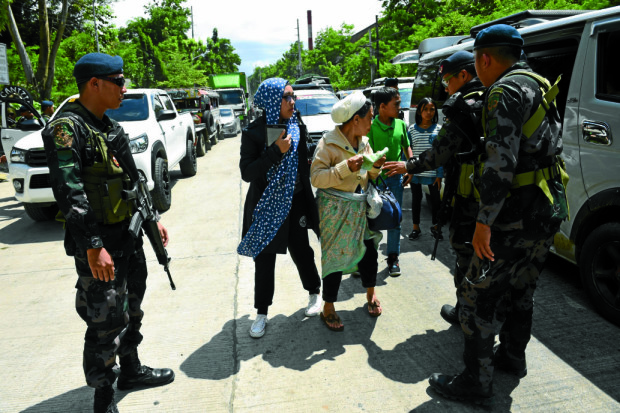
Police officers check evacuees from Marawi at a checkpoint by the entrance of Iligan City in of Mindanao on May 24, 2017. President Rodrigo Duterte warned that martial law would be “harsh” and like a dictatorship, after imposing military rule in the south to combat Islamist militants. AFP
President Rodrigo Duterte’s declaration of martial law in Mindanao does not mean that the military now supersedes civilian authority, acting Interior Secretary Catalino Cuy said.
In a memorandum released on Thursday, Cuy also said that the suspension of the privilege of the writ of habeas corpus in Mindanao covers only persons charged with rebellion or invasion.
“A state of martial law does not suspend the operation of the Philippine Constitution, nor supplant the functioning of the civil courts or legislative assemblies,” Cuy said.
“In its strict sense, the military arm of the government does not supersede civil authority but is called upon merely to aid in the execution of its function,” he added.
READ: Martial law will be harsh, says Duterte
The memo was directed to Department of Interior and Local Government (DILG) officials, the Philippine National Police, and other bureaus and agencies of the DILG.
“It also bears emphasis that placing Mindanao under martial rule does not permit curtailment of civil and political rights. The proclamation does not affect the right to bail,” Cuy said.
“The DILG, all its bureaus, offices and attached agencies are hereby enjoined to observe the rule of law and ensure the observance of human rights in the place or part of the country where martial law was proclaimed and the prerogative writ of liberty suspended,” he added.
READ: Ramos says martial law OK only for parts of Mindanao
Cuy said that unless in cases of rebellion in invasion, the legality of habeas corpus as a remedy remains.
“It must be noted that the suspension of the privilege of the writ shall apply only to persons judicially charged for rebellion or invasion and such persons must be charged within three days from apprehension,” Cuy said.
“Outside the offenses mentioned, habeas corpus as a remedy for challenging the legality of one’s detention continues,” he added./rga